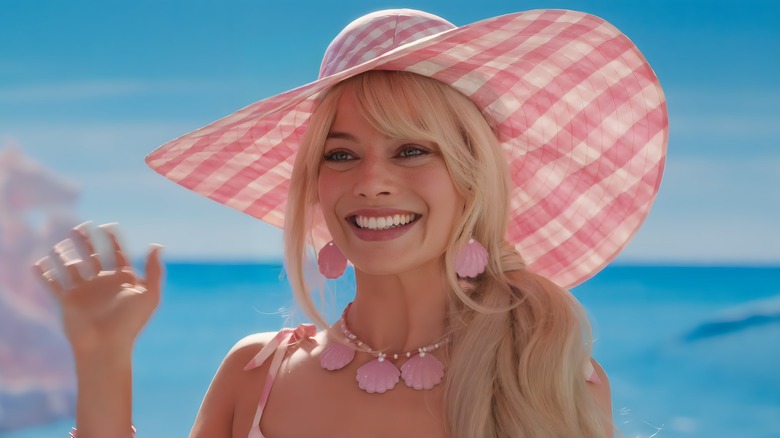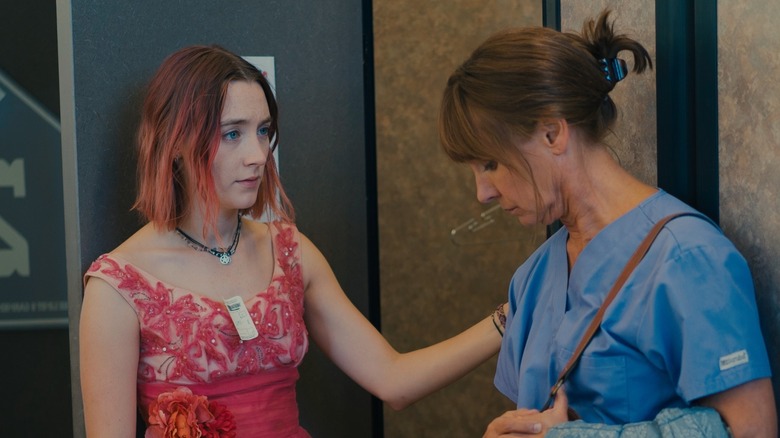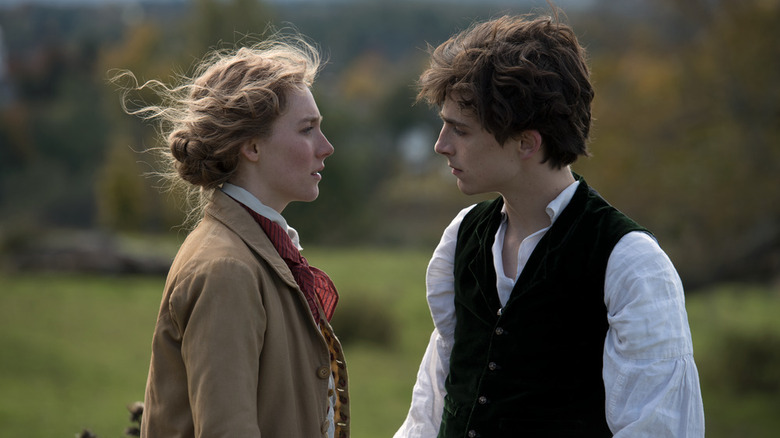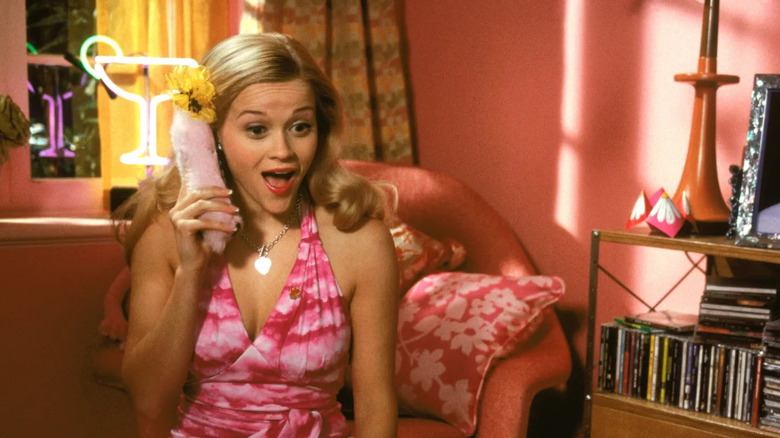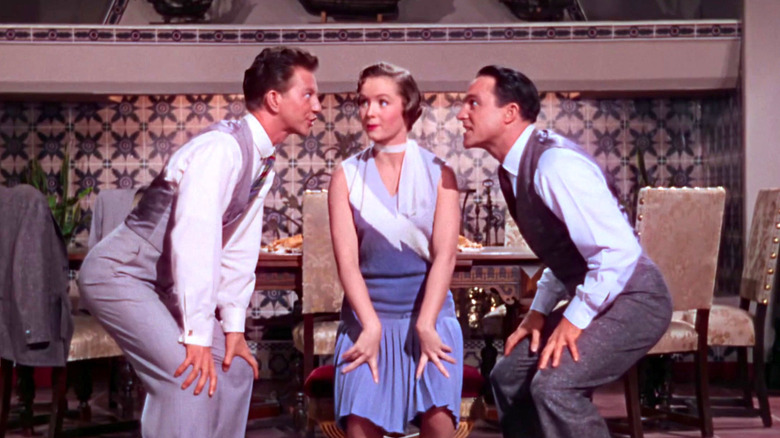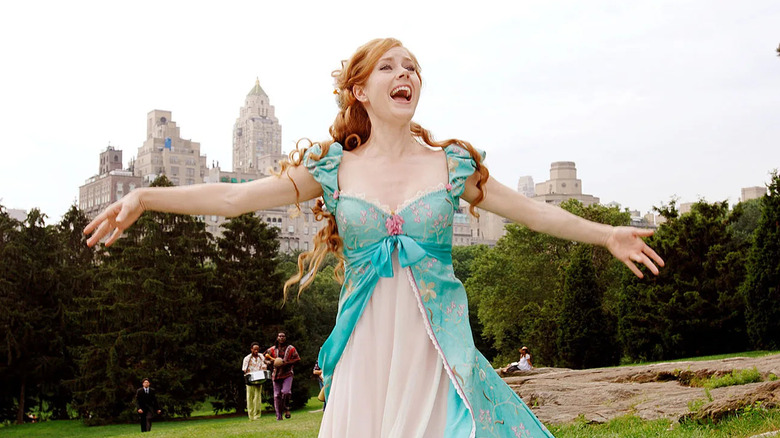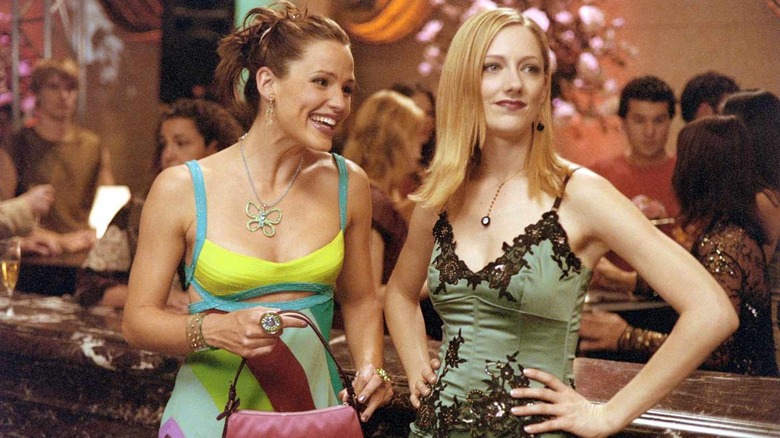Movies Like Barbie You Should Watch Next
Did you love Greta Gerwig's "Barbie?" You're not alone. The movie ultimately crossed the $1 billion mark within a month of its initial release, and there's already decent Oscar buzz surrounding not just Gerwig's direction and her script with Noah Baumbach, but the film's central performances by Margot Robbie and Ryan Gosling as Barbie and Ken, respectively. (There are some people who didn't like it, but, go figure.) The movie sees Robbie's Barbie — often referred to as "Stereotypical Barbie" — discover what the world is like beyond the pink utopia of Barbie Land, and the existential crisis that leads her to want to become something mor than a doll.
If you went and checked out "Barbie" and loved its irreverent, subversive take on a beloved American toy and its over-the-top, immaculately realized design and look, you're in luck. Before "Barbie" leaves theaters and becomes available for you to watch on repeat in the comfort of your own home, there are plenty of movies similar to "Barbie" you could check out in the meantime. Gerwig has directed two other movies, both of which feel like spiritual predecessors to "Barbie," and beyond that, there's a whole list of inspirations for this ambitious, delightfully candy-coated, deceptively feminist film. From silver-screen classics to feminist flicks to Gerwig's other work, here's a short list of films you should watch after "Barbie."
Lady Bird
In Greta Gerwig's solo directorial debut, 2017's "Lady Bird," she provided a semi-autobiographical look at the life of a teenager in Sacramento, California in the mid-aughts — and while this doesn't seem to have a lot in common with "Barbie" at first, bear with us. Gerwig has, in all three movies she's directed since 2017, been focused on stories about women at all stages of their life, and "Lady Bird" is an excellent entry into the "coming-of-age" genre.
Christine "Lady Bird" McPherson (Saoirse Ronan), a senior in high school who's desperate to escape Sacramento and discover something new, is constantly at odds with her mother Marion (an outstanding Laurie Metcalf) as she tries to figure out exactly who she is before heading off to college. Much like Barbie, Lady Bird is leaving the most innocent time of her life behind and trying to become something completely different, forsaking her best friend Julie (Beanie Feldstein) for a more popular crowd that includes the genuinely insufferable Kyle (Timothée Chalamet). After she realizes Kyle and his friends don't care about her at all, Lady Bird reunites with Julie — and beyond that, she gets into college in New York, finally missing her family after her first big night out. "Barbie" is about discovering what's really inside of you... and so is "Lady Bird."
Little Women
Gerwig's follow-up to "Lady Bird" came just two years later in "Little Women," which reunited her with Ronan and Chalamet as two of the story's leads and gave her a chance to adapt a beloved piece of Americana. (Sound familiar?) Ronan takes the narrative's wheel as Jo March, the headstrong writer who wants nothing more than to create great works of art, with Chalamet's Theodore "Laurie" Laurence as her best friend who spends years pining for her. The two are flanked by Florence Pugh as Amy March (who, with Gerwig's help, breathes new life into the often odious aspiring artist), Emma Watson as the happily domestic Meg March, Eliza Scanlon as the quiet, sickly Beth March, and Laura Dern as their mother, who brings them all together.
There are two clear links between "Barbie" and "Little Women," and the first is the unique spin Gerwig brings to the source material. As she transforms what could be a cookie-cutter story about a doll into a treatise on the ills of patriarchy and women's inner power, she uses a non-linear storytelling technique in "Little Women" that puts a fresh coat on Louisa May Alcott's classic story... and features an ending Alcott herself would likely love. The second is that both movies feature a big, stirring speech about the contradictions of being a woman, both of which will tug at your heartstrings as you nod along with Ronan's Jo in "Little Women" or America Ferrera's Gloria in "Barbie."
Legally Blonde
Few movies have held up as well throughout the years as "Legally Blonde." Released in 2001, the story of a heartbroken girl who takes charge of her life and ends up becoming a high-powered lawyer has become a classic staple of the "girl power" genre, though that's a pretty reductive term when it comes to a film this clever. Enter Elle Woods (Reese Witherspoon), the plucky president of her sorority who truly, genuinely believes her boyfriend is about to propose. When he dumps her because he needs to date somebody more "serious," Elle takes notice — and though she only applies to Harvard Law School to follow her ex-boyfriend and win him back, she ends up getting in on her own merit, and discovers she's so much more capable than she ever imagined.
Both "Legally Blonde" and "Barbie" are led by a bubbly blonde who realizes she's worth more than she expected, and certainly above being an accessory to some man — and both movies teach you that depending on yourself is the key to success. As Elle says in her valedictorian speech at the end of "Legally Blonde," not only must you "always have faith in people, you must always have faith in yourself" — and we definitely think Robbie's Barbie would agree. Elle might even inspire Ken, too; after all, they're both "kenough" just as they are.
Singin' in the Rain
Gerwig made a Letterboxd list packed with movies that inspired her work on "Barbie," and it's not entirely surprising that "Singin' in the Rain" was part of that collection. Released in 1952, the film tells the story of Hollywood's transition from silent movies to "talkies" and the growing pains that came with it, focusing on dreamboat Don Lockwood (Gene Kelly) and his struggles with his leading lady Lena Lamont (Jean Hagen). After he and his best friend and dance partner Cosmo Brown (Donald O'Connor) discover Kathy Selden (Debbie Reynolds), who has a stunning singing voice that can be used to dub Lena, hijinks ensue as they try and help their first "talkie" succeed by making it into a musical.
Gerwig cited this movie and "The Red Shoes" as inspirations thanks to their musical and dance numbers, which makes sense; musicals take place in a heightened reality, as does her "Barbie" film. Plus, Both "The Red Shoes" and "Singin' in the Rain" provided a healthy amount of inspiration for "Barbie," according to Gerwig — especially for Ken's dream ballet, which bears a striking resemblance to the "Broadway Melody" number in "Singin' in the Rain." There's never a bad time to watch "Singin' in the Rain," but it pairs perfectly with "Barbie."
Enchanted
Want another film about a figure who's beloved to young girls across the world being transplanted into the gritty, uncomfortable real world? You'll want to watch "Enchanted." This 2007 Disney movie is a delightful spin on the fairytale genre as it brings Giselle (Amy Adams), a cartoon Disney princess, into New York City, where she wanders around singing and charming everyone around her while her Prince (James Marsden) feverishly searches for her. Well, she maybe doesn't charm everybody — Robert (Patrick Dempsey) encounters Giselle along with his daughter Morgan (Rachel Covey) and is baffled as to why she won't stop bursting into song and summoning vermin to help her clean his house.
Both Giselle and Barbie are effervescent, optimistic characters who find themselves in an entirely new environment and have to adjust — though, considering that Giselle is still in a Disney movie, she faces a much easier existence than Barbie, who immediately finds herself faced with rampant sexism. "Enchanted," in some ways, is the diet version of "Barbie," but there's certainly overlap between Barbies and Disney princesses — so watching them face a stark reality is pretty fascinating.
13 Going on 30
In yet another example of someone being transported to a time or place that isn't quite their own, 2004's "13 Going on 30" watches as Jenna Rink (Jennifer Garner) wakes up after her disastrous 13th birthday party only to find that her haphazard wish came true, and she turned 30 overnight in a very literal sense. Confronted with her boyfriend and best friend Lucy (Judy Greer), Jenna discovers that she got everything that her 13-year-old self wanted, like a high-powered magazine job and a closet full of gorgeous, brightly colored clothes. The downside, though? She's not a very good person, and the love of her life, Matt (Mark Ruffalo), is with somebody else because Jenna ended their friendship years earlier.
Jenna and Barbie both wake up in a new place to startling revelations: Jenna realizes that she's gained power and influence by putting down people around her, and Barbie suddenly understands that just because Barbie Land is a matriarchy doesn't mean they "solved" sexism out in the real world. In the end, their journeys are similar, as they both have to figure out what it is that they really want before they can truly move forward — Jenna ultimately marries Matt, and Barbie gives up her perfect doll life to become a messy, imperfect human.
